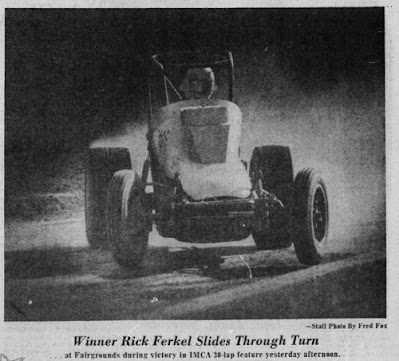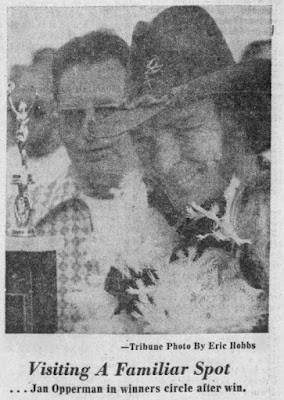Tampa, Fla. – The first program of the 55th and final Winternational Sprints was scheduled for February 5 but rained out, pushing the opener to February 8.
Three caution flags didn’t prevent Rick Ferkel of Bowling Green, Ohio, from winning by three-quarters of a lap over the rest of the field when the checkers waved on the 30-lapper. He finished ahead of Chuck Amati of Marion, Ill., and Greg Leffler of North Vernon, Ind.Joe Saldana of Lincoln, Neb., set a new track record in winning the 15-lap consolation. He was timed in 6 minutes and 48.46 seconds, breaking Jud Larson’s mark of 6 minutes and 55.69 seconds set in 1969. Heat races were won by Roger Rager, Lincoln, Neb., Darryl Dawley, Sioux Falls, S.D., and Larry Kirkpatrick, Wood River, Ill.
The defending IMCA national sprint car champion, Bill Utz, Sedalia, Mo., would take starter Johnny Hick’s checkered flag first in the 30-lap feature on February 10. Utz had a little luck on his said as race leader Ralph Parkinson Jr., Kansas City, Mo., dropped out with only two laps to go in the race, handing Utz the win. Dick Tobias, Lebanon, Penn., finished second followed by Jan Opperman, Noxon, Mont.
Three hotly contested heat races were won by Butch Wilkerson of Indianapolis, Darryl Dawley, and Larry Kirkpatrick. Rick Ferkel, the Saturday’s feature winner, won the special match race while Chuck Amati won the consolation.
After a one-hour rain delay, Darryl Dawley scored his first career IMCA sprint car feature win on February 12. Ralph Parkinson Jr. would give Dawley a run for his money in the 30-lap main event but settle for second place while Joe Saldana finished third.
Jan Opperman, Rick Hood of Memphis, Tenn., and Doc Dawson of Lima, Ohio, were heat winners while Saldana won the consolation race.
Before a crowd of 7,517, Jan Opperman would win the fourth race of the Winternational Series, a 50-lap victory on February 15. Starting eighth in the field, Opperman didn’t make his move until late, yet won comfortably over Rick Ferkel and Dick Tobias. He found himself in a duel with race-long leader Bill Utz until lap 37 when Utz dropped out with mechanical issues. The victory earned him $1,000 plus $544 in lap money. Utz, who didn’t even finish in the top-10, but still earned $1,200 in lap money.
Opperman, Ferkel and Ed Lynch, Apollo, Penn., were heat winners and Cliff Cockrum, Carbondale, Ill., was the consolation winner.
The Winternational Series closed on February 16, with Jan Opperman winning his second IMCA sprint car feature in a row, winning the 30-lap feature in a race that was a near mirror-image of his Saturday victory. Dick Sutcliffe, Greenwood, Mo., took the early lead and was pulling away when Ralph Parkinson Jr., lost a wheel on lap 16 and caused a minor five-car pileup. When racing resumed, Opperman, who had been cruising in second place, wasted little time in taking command. He took the lead on lap 21 and roared home from there.
Sutcliffe hung on for second while Ray Lee Goodwin, Kansas City, came home in third. Lee Osborne of Alexandria, Va., Sutcliffe, and Kramer Williamson of Clearfield, Penn., were heat winners. Opperman won the match race, and Ralph Blackett of Des Moines won the consolation.
Opperman was crowned the 1975 Winternational Series champion.
Point Standings –
1. Jan Opperman – 800
2. Rick Ferkel – 545
3. Dick Tobias – 445
4. Bill Utz – 435
5. Ralph Blackett – 425
6. Darryl Dawley – 415
7. Ray Lee Goodwin – 400
8. Joe Saldana – 350
9. Ralph Parkinson Jr. – 325
10.Del Schmidt – 300









































